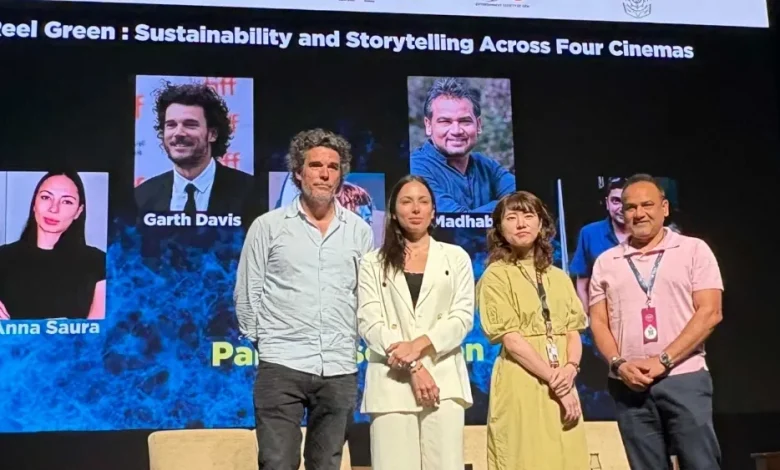Sustainability Sparks Calls for Industry Reform at International Film Festival of India: ‘The Beginning of a New Era’

Sustainability in filmmaking isn’t advancing fast enough, and real progress will require structural reform, cultural change, and mandatory standards — that was the blunt consensus from filmmakers across Japan, Spain, Australia and India at the International Film Festival of India’s “Reel Green” panel.
Curated by Gouri Nair, head programming – masterclass and domestic film festivals and moderated by Naman Ramachandran of Variety, the panel featured producers Mina Moteki (Japan) and Anna Saura (Spain) and directors Garth Davis (Australia) and Nila Madhab Panda (India). Across their distinct contexts, the filmmakers agreed that meaningful environmental progress in film industries must come not only from practical reforms and willingness from the top, but also through deep cultural change.
The IFFI panel explored how national industries, each shaped by their own traditions, pressures, and protocols, are either shifting toward greener, more responsible filmmaking, or still struggling to introduce mandated sustainable practices.
Garth Davis, director of the Oscar-nominated “Lion,” tied the sustainability challenge to a broader moral and relational crisis. “The state of the planet is a reflection of the state of us and our relationships,” he said. His filmmaking aims to “remind people of respect and kindness,” embedding environmental consciousness into the stories themselves. Davis described earlier commercial work where teams voluntarily added a carbon tax to budgets to fund offsets – small steps that laid groundwork for larger systemic ideas. He also warned of the fast-rising energy demands of AI, urging investors to take a long-term view so that data centres are powered by green energy.
Producer Mina Moteki of Kowatanda Films, Japan, described how sustainable practices collide with entrenched production traditions in Japan – such as printed scripts and long working hours. She stressed that before Japan can transition meaningfully to greener production, the industry must first address workplace health. “Before considering an eco-friendly environment, we have to have a workplace for crew and cast that is much healthier.”
Moteki also noted Japan’s contrasting environmental footprints in anime, now a $25 billion industry, and live-action production. While their impacts differ, she emphasised that cultural and labour reforms must come first. In practice, she and other independents rely on digital documents, local crews, public transport, and minimal set construction to reduce waste. She acknowledged the need for Japan to learn from global counterparts and expressed a personal duty “to spread the knowledge so that we can move forward.”
Spanish film and documentary producer Anna Saura offered an example of what structural change looks like when embedded into national policy. Spain requires productions receiving public funds to follow sustainability protocols and obtain certification. “If you don’t get this certificate, you cannot get the money,” she stated. She also stressed the importance of training film students so sustainability becomes as fundamental as lighting or directing.
When asked whether sustainable practices improve filmmaking craft, Saura said, “I’m not sure that it’s improving the industry… but it can help the world.” She acknowledged that green equipment and certification can be costly, particularly for low-budget productions, but insisted that sustainability must become a standard requirement, a basic expectation rather than an add-on. “I think we’re at the very beginning of this new era of sustainability in the film industry. That’s why it’s very important,” she said.
Indian filmmaker Nila Madhab Panda, known for climate-focused films, reinforced the argument for accountability, describing the industry’s waste output as “insane.” He added, “This is a business of creativity. We may not compromise on that. But we could get conscious from day one, and say, onboard a creative sustainability director, who looks into green practices from the budgeting and pre-production stages,” He suggested the introduction of a sustainable carbon incentive from governments. “We should start putting carbon information as a label from the beginning of the film,” adding that sustainable practices often boost morale by creating “guilt-free” work environments.
Davis agreed, adding that sustainable habits create “a general lift in energy and optimism,” and that crew members now frequently approach producers with proposals to reduce their footprint, from cycling to set to adopting solar-powered rigs. “There’s a real willingness,” he said.
The panel also explored strategies for repurposing sets, props, and food. Davis described discussions in Australia about preventing the destruction of sets kept for copyright or reshoots. Moteki outlined indie practices such as using natural locations, donating costumes, and giving away leftover bento boxes to avoid food waste. Saura noted that renting rather than building is standard in Spain, and end-of-shoot markets allow crew to buy or take wardrobe and props.
Across regions, the panellists agreed that sustainability requires cultural shifts, stronger labour structures, mandatory guidelines, and daily habits. The message was clear: the industry is still “at the very beginning of this new era,” as Saura said, but with shared knowledge and structural reform, sustainable filmmaking can set a benchmark for environmental responsibility.





